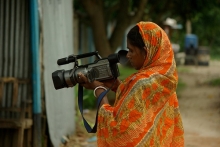
For each of the six weeks, there was a posted reading, and an assignment: usually to write something on the class online platform. Participants were free to do so anytime, 24/7, within the week. The course instructors responded. There was no Skype or video conferencing. Participants were expected to put in perhaps 2-3 hours per week, depending on how fast they are. This consisted of reading, thinking, writing.
ICFJ followed the online course with a five-day conference in Sri Lanka that brought together the 25 best participants from the online course, who proposed the best projects. The projects were grouped together for regional cooperation. The groupings helped each of the journalists report their stories in a more responsible and informed way, and created a lasting change in the journalists’ understanding of one another’s cultures.
Through these joint reporting projects, to be broadcast or published by each journalist’s own media organization, audiences throughout the region benefited from more nuanced and in-depth reporting on critical cultural, religious and social issues. The project selections were made before the Colombo conference. This gave the journalists an opportunity to plan their reporting together. They also presented their story ideas to the larger conference group, which helped brainstorm ideas for improving the projects. The conference in Colombo also included panel discussions, site visits and small group breakout meetings.
By participating in this conference as well as the online course, those selected for the program picked up new skills in investigative journalism and journalism ethics, and learned the customs and cultures of one another's homeland to better the quality of their own journalism endeavors.
Applicants could communicate well in English, Hindi or Urdu; interpretation was provided. All expenses for this program were paid.

